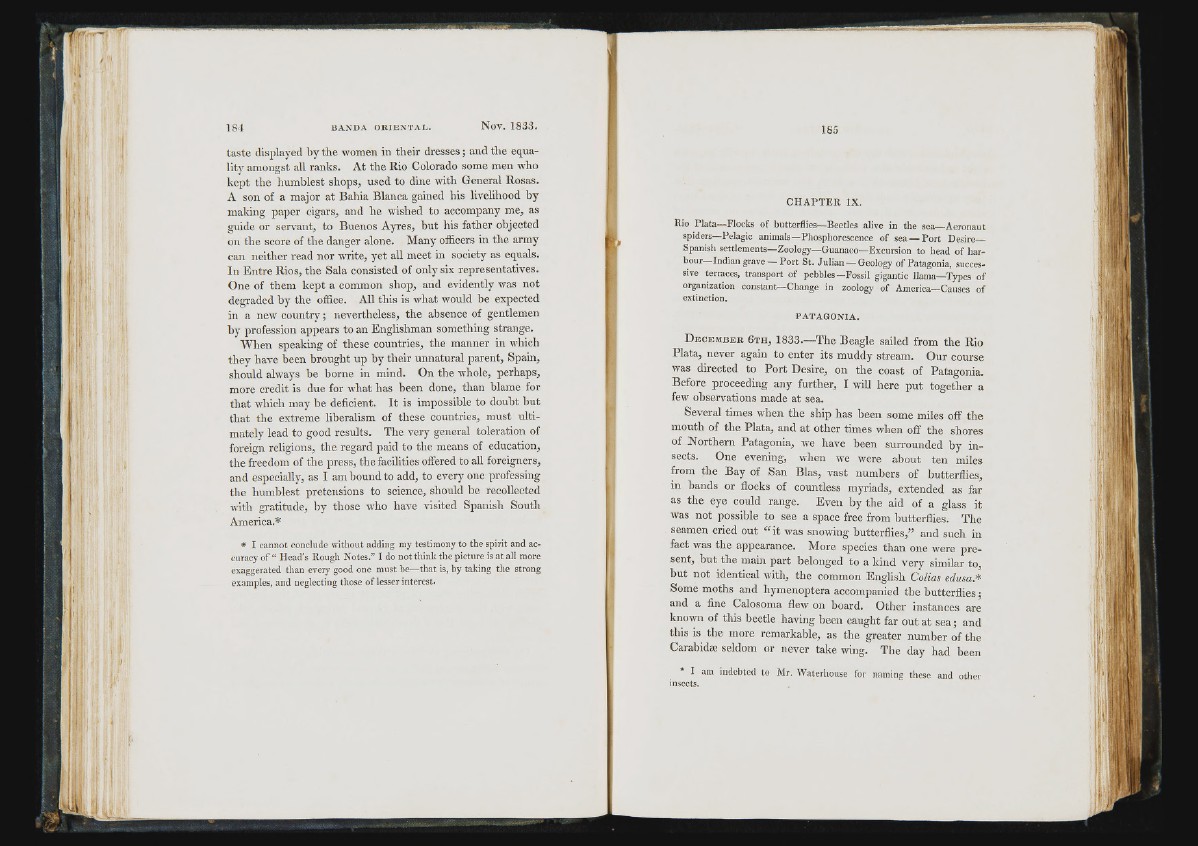
184 BA ND A O R IE N T A L . Nov. 183,3.
taste displayed by the women in their dresses; and the equality
amongst all ranks. At the Rio Colorado some men who
kept the humblest shops, used to dine with General Rosas.
A son of a major at Bahia Blanca gained his livelihood by
making paper cigars, and he wished to accompany me, as
guide or servant, to Buenos Ayres, but his father objected
on the score of the danger alone. Many officers in the army
can neither read nor write, yet all meet in society as equals.
In Entre Rios, the Sala consisted of only six representatives.
One of them kept a common shop, and evidently was not
degraded by the office. All this is what would be expected
in a new country; nevertheless, the absence of gentlemen
by profession appears to an Englishman something strange.
When speaking of these countries, the manner in which
they have been brought up by their unnatural parent, Spain,
should always be borne in mind. On the whole, perhaps,
more credit is due for what has been done, than blame for
that which may be deficient. It is impossible to doubt but
that the extreme liberalism of these countries, must ultimately
lead to good results. The very general toleration of
foreign religions, the regard paid to the means of education,
the freedom of the press, the facilities offered to aU foreigners,
and especially, as I am bound to add, to every one professing
the humblest pretensions to science, should be recollected
with gratitude, by those who have visited Spanish South
America.*
* I c a n n o t c o n c lu d e w ith o u t a d d in g m y te s tim o n y to th e s p ir it a n d acc
u ra c y o f “ H e a d ’s R o u g h N o te s .” I d o n o t t h in k th e p ic tu r e is a t a ll m o re
e x a g g e ra te d th a n e v e ry g o o d o n e m u s t b e— t h a t is, b y ta k in g th e s tro n g
e x am p le s, a n d n e g le c tin g th o s e o f les s e r in te r e s t.
J ,
3 SB
C H A P T E R IX.
R io P l a ta— F lo c k s o f b u tte r flie s— B e e tle s a liv e in th e se a— A e ro n a u t
sp id e r s— P e lag ic a n im a ls— P h o s p h o r e s c e n c e o f s e a— P o r t D e s ire
S p a n ish s e ttlem e n ts— Z o o lo g y— G u a n a c o— E x c u r s io n to h e a d o f h a r b
o u r— I n d ia n g rav e — P o r t S t . J u l i a n — G e o lo g y o f P a ta g o n ia , su ccess
iv e te rra c e s , tr a n s p o r t o f p e b b le s—F o s s il g ig a n tic llam a— T y p e s o f
o rg a n iz a tio n c o n s ta n t— C h a n g e in z o o lo g y o f A m e ric a— C a u s e s o f
e x tin c tio n .
PA TA G O N IA ,
D e c e m b e r 6 t h , 1833.—The Beagle sailed from the Rio
Plata, never again to enter its muddy stream. Our course
was directed to Port Desire, on the coast of Patagonia.
Before proceeding any further, I will here put together a
few observations made at sea.
Several times when the ship has been some miles off the
mouth of the Plata, and at other times when off the shores
of Northern Patagonia, we have been surrounded by insects.
One evening, when we were about ten miles
from the Bay of San Bias, vast numbers of butterflies,
in hands or flocks of countless myriads, extended as far
as the eye could range. Even by the aid of a glass it
was not possible to see a space free from butterflies. The
seamen cried out “ it was snowing butterflies,” and such in
fact was the appearance. More species than one were present,
but the main part belonged to a kind very similar to,
but not identical with, the common English Colias edusa.*
Some moths and hymenoptera accompanied the butterflies;
and a fine Calosoma flew on board. Other instances are
known of this beetle having been caught far out at sea ; and
this is the more remarkable, as the greater number of the
Carabidsc seldom or never take wing. The day had been
* I am in d e b te d to M r, W a te rh o u s e for n am in g tlie se a n d o th e r
in sects.
l.Hi